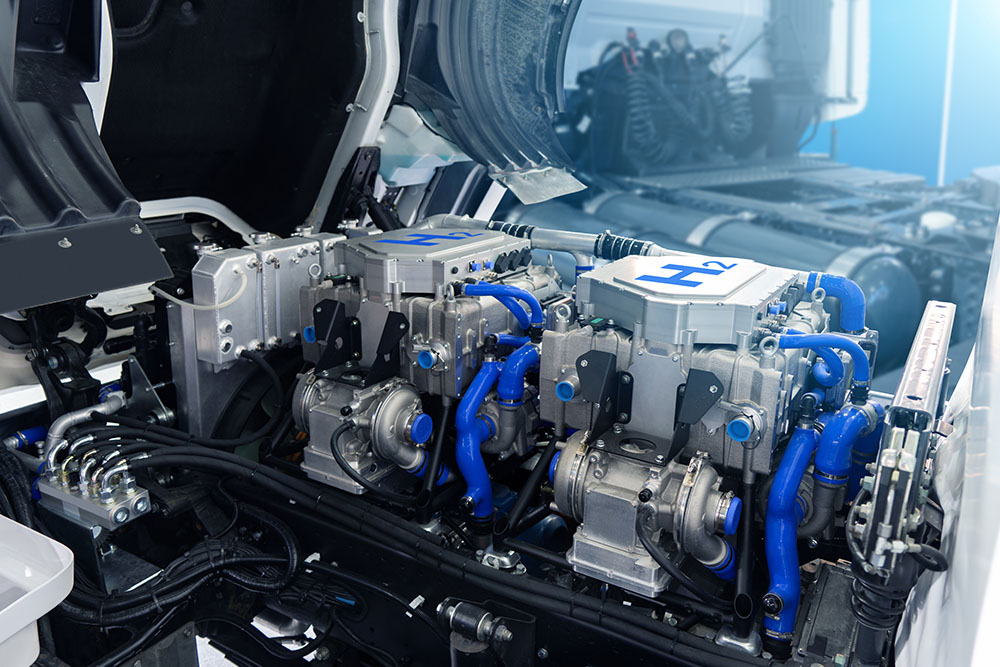What the Autumn Budget means for the logistics sector
04 Nov 24
Read more →

Even though decreasing battery costs and the introduction of purpose built electric vehicles (EVs) are helping short-haul freight, operations that cover long distances see the limitations of the technology. Batteries, with their insufficient energy supply, slow charging times and heavy weight, struggle to meet the demands of long-haul transport.
Thankfully, there is an attractive alternative: hydrogen-powered fuel and combustion. With rapid refuelling and extended range, the element could prove crucial in revolutionising the highly competitive transportation industry.
The big question is; how clean is hydrogen? With no harmful environmental impact during operation, hydrogen fuel cells produce only heat and water as byproducts. Unlike fossil fuels, hydrogen fuel cells do not emit greenhouse gases, thereby reducing pollution and enhancing air quality.
Of course, being environmentally-friendly is only the first part of the battle – efficiency is the ultimate key to success. Hydrogen excels in both fronts surpassing many other energy sources, including various green solutions.
This high fuel efficiency results in the generation of more energy per unit of fuel. For instance, traditional combustion-based power plants produce electricity at an efficiency rate of 33-35%, while hydrogen fuel cells can achieve up to 65%. This efficiency extends to vehicles as well, with hydrogen fuel cells utilising 40-60% of the fuel’s energy and simultaneously reducing fuel consumption by 50%.

As previously mentioned, speed of charging has been a key factor holding back hauliers from adopting electric vehicles. Once again, in relation to charge time, hydrogen fuel cells outshine their battery-powered counterparts and compare to that of a conventional internal combustion engine (ICE).
While electric vehicles may require anywhere from 30 minutes to several hours to charge, hydrogen fuel cells can be refilled in less than five minutes. This speed ensures that hydrogen-powered vehicles offer the same convenience as traditional ICE vehicles.
With the aforementioned factors in mind, it’s clear to see why hydrogen is emerging as a pivotal solution for decarbonising various industries – extending beyond transport. Industrial sectors like steel, cement and refineries as well as marine, aviation, rail and mining also face similar hurdles due to technological limitations of electrification.
Over the coming years, an increase in hydrogen-powered vehicles on the road is expected – with a significant proportion coming from the logistics sector. Commercial vehicles are expected to constitute about 95% of hydrogen demand by volume in the future.
Countries like Japan and South Korea are actively supporting hydrogen for passenger cars, whilst European roads could see up to 850,000 hydrogen-fuelled medium and heavy-duty trucks by 2035. Toyota and VDL Groep have already launched their first hydrogen fuel cell demonstration truck, marking significant steps in advancing hydrogen technology.

Although the prospect of hydrogen fuel is certainly promising – there are several drawbacks. Firstly, hydrogen isn’t readily available in its pure form and must be extracted from water through electrolysis or separated from carbon fossil fuels, both of which are energy-intensive processes. Additionally, these extraction methods often rely on fossil fuels, which can undermine the eco-friendly aspects of hydrogen production.
Another problem surrounds the production of hydrogen fuel cells – this technology requires a substantial amount of investment and political commitment before it can be considered a viable energy source. At present, the cost of power from hydrogen fuel cells is higher than many other energy sources, including solar panels. While this may change with technological advancements, it currently stands as a barrier to widespread hydrogen adoption.
Lastly, there are safety concerns due to hydrogen’s highly flammable nature. Even a small spark can cause uncontrolled combustion leading to huge explosions – think of the 1937 Hindenburg disaster!
Hydrogen certainly has the potential to replace fossil fuels – and perhaps even electric vehicles – and emerge as the prominent energy-source of the 21st century. However, before we can commit to this technology, there are clear challenges to overcome.
While we await the arrival of eco-friendly heavy goods vehicles (HGVs) on the roads, businesses can take proactive steps to reduce their environmental footprint. TrackTrans offers cutting-edge transport management software to streamline multi-drop deliveries and create environmentally efficient plans. Visualise work on a map, plan routes and consolidate jobs into efficient loads, providing the data planners need to reduce risk, cut running costs and minimise their carbon footprint.
Explore our free demo today and gear up for a sustainable and green future!
See how TrackTrans can be tailored to your business with no obligation. Simply complete the form and a member of our sales team will contact your directly.